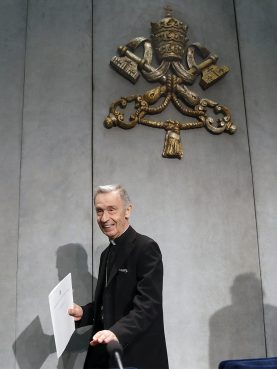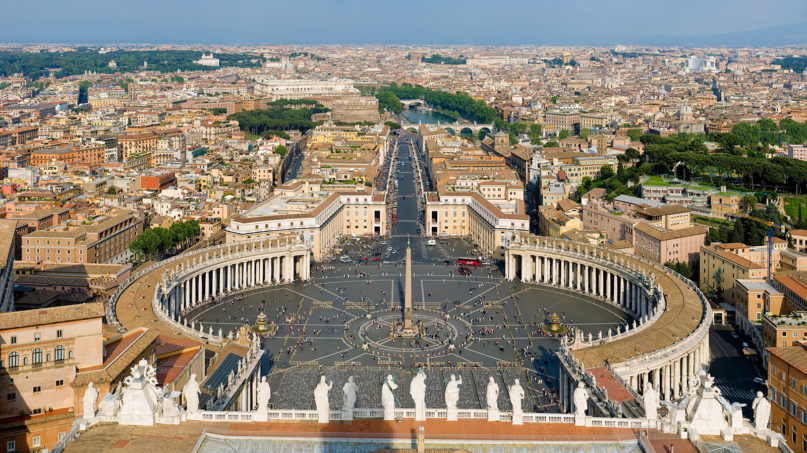VATICAN CITY (RNS) — Next time you see a headline relaying juicy quotes from a Catholic prelate, the Vatican suggested today, take it with a grain of salt.
The head of the Vatican doctrinal office, once known as the Inquisition, made it clear on Tuesday (Sept. 22) that only the pope and the bishops of the church as a whole can make infallible statements on doctrinal matters. A single bishop speaking to reporters does not speak for the church.
“When a bishop opens his mouth he doesn’t speak infallibly or with the authority of the Magisterium of the Catholic Church,” said Cardinal Luis Francisco Ladaria Ferrer, who heads the powerful Congregation for the Doctrine of the Faith, answering journalists’ questions at a news conference.
The news conference at the Vatican was to present a new document by the CDF, “Samaritanus bonus,” meaning the good Samaritan. The lengthy text, approved by Pope Francis on June 25, reiterates the Catholic Church’s position regarding end-of-life issues, emphasizing the dignity of human life and against any form of euthanasia.
“The Church is convinced of the necessity to reaffirm as definitive teaching that euthanasia is a crime against human life because, in this act, one chooses directly to cause the death of another innocent human being,” the document said. “Euthanasia, therefore, is an intrinsically evil act, in every situation or circumstance.”
Given that this has long been the Vatican’s position on euthanasia, there was some question why Ladaria’s department felt the need to restate it. The document itself took pains to explain that increasing individualism, a misplaced sense of compassion for the dying and today’s utilitarian society made the new document urgent.

Archbishop Luis Francisco Ladaria Ferrer presents a document at the Vatican on May 17, 2018. (AP Photo/Alessandra Tarantino)
In particular Spain, Ladaria’s native country and once a bastion of western Catholicism, is currently considering decriminalizing euthanasia. Cardinal Juan Jose Omella of Barcelona recently told reporters that Pope Francis is “worried” about what will happen if the legislation passes.
But the crackdown by the CDF on euthanasia comes soon after Archbishop Vincenzo Paglia, head of the Pontifical Academy for Life, pushed the conversation to the fore. In late 2019, Paglia was asked if priests should be present at assisted suicides to comfort the person despite the church’s teaching.
“According to us, no one should be abandoned,” Paglia said, while making clear that he considered assisted suicide “a great defeat,” and refusing to allow reporters to take his comment as “a rule” on the issue.
The document issued on Tuesday hints that it was motivated at least in part by Paglia’s remark. “The Church is obliged to intervene in order to exclude once again all ambiguity in the teaching of the Magisterium concerning euthanasia and assisted suicide, even where these practices have been legalized,” it stated.
Another clue that Paglia’s ambiguity was the target of the document was that the academy, a sort of Vatican think tank on church doctrine about the sanctity of life that has organized international conferences in the past on end-of-life issues, wasn’t invited to participate in refining the document or to Tuesday’s news conference.
RELATED: Archbishop’s remarks on assisted suicide stir culture war skirmish at the Vatican
If any doubt remained about Paglia’s take on assisted suicide, Ladaria explained to the press that the Magisterium of the Church, or its authority as the interpreter of God word, “cannot be reduced to a single declaration of a single bishop because it can be wrong.”
“A council is not the same as a statement to a journalist. This must be clear,” the cardinal said. “Just as an encyclical or a papal speech are not the same as something I might say to reporters.”
In his remarks, Ladaria also addressed the case of the Rev. Tony Flannery, who was banned from ministry by the CDF after his statements promoting women priests, same-sex marriage and gender theory.
“It is the duty we have according to the dispositions of our church to safeguard the faith and point to things that are not in accordance with the faith,” Ladaria said.
“This is a very unpleasant responsibility for the CDF, but it is our responsibility, and it would be a failure on our part if we didn’t exercise this responsibility and set it aside in moments when instead we must speak up.”





